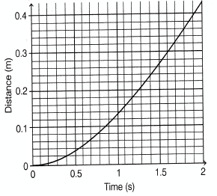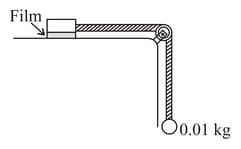Viscosity
Viscosity: Overview
This topic covers concepts, such as, Viscosity of Fluids, Viscous Force, Fluidity: Relation With Coefficient of Viscosity & Kinematic Viscosity etc.
Important Questions on Viscosity
The kinematic viscosity is a measure of the resistive flow of a fluid under the weight of gravity.
How the kinematic viscosity is different from the absolute viscosity?
Coefficient of kinetic friction can be found out by inclined plane method and horizontal plane method.
What happens to the coefficient of viscosity if the temperature increases?
For an extremely ductile metal the true fracture strain calculated from the reduction in the area of the specimen the and the elongation in the length of the sample will have different values.
When the temperature is increased, the viscosity of a liquid is
A steel ball is dropped in a viscous liquid. The distance of the steel ball from the top of the liquid is shown below. The terminal velocity of the ball is closest to

What is the dimensional formula for the ratio of force to viscosity?
What would be the dimensional formula of viscosity if the dimensional formula of area is ?
Name a substance which is a non-Newtonian fluid?
(Choose from: Blood/Water/Emulsion paint)
Name a substance which is Newtonian fluid from the following:
(Choose from: Blood/Honey/Water/Shampoo)
A metal block of Film area is connected to a mass is string that passes over a massless and frictionless pulley as shown figure. A liquid with a film thickness of is placed between the block and the table. When released the block moves to the right with a constant speed of . The coefficient of viscosity of the liquid is (Take )

Glycerine is filled in wide space between two large plane horizontal surfaces. A thin plate of area at a distance of from one of the surfaces is in horizontal position between the plates inside the glycerine. It is dragged horizontally at a constant speed of Take coefficient of viscosity . If the force required to drag the plate at constant speed is newton, find the value of

A small spherical drop falls from rest in a viscous liquid. Due to friction, heat is produced. The correct relation between the rate of production of heat and the radius of the spherical drop at terminal velocity will be
There is a 1 mm thick layer of water between a plate of area and another very big plate. The coefficient of viscosity of water is 0.01 poise. Then, the force required to move the smaller plate with a velocity of 10 cm/sec with respect to the larger plate is:
